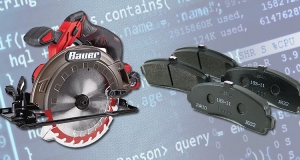The safety of everyone who drives one of SGN’s vans or in their cars to work is reliant on the use of their vehicle’s brake pads.
And once they get in to the office they may rely on their computer to run a complex algorithm.
If you’re an engineer on the tools you may even need to use a circular saw to get the job done.
But what do brake pads, the first computer algorithm, and a circular saw all have in common?
They were all invented by women.
This week I’ve been looking at campaigns from around the world as part of the build up to International Women’s Day. Let’s cross the pond to the USA to look at two campaigns getting girls into engineering.
Microsoft’s #MakeWhatsNext
In 2016, Microsoft launched their #MakeWhatsNext campaign aimed at encouraging girls and women to stick with STEM subjects (science, technology, engineering and mathematics).
With only 7% of US patents held by women, and only 6.7% of women graduating in a STEM subject, Microsoft launched the #MakeWhatsNext campaign to highlight their new Patent Program.
It encouraged girls to share their ideas with the world, connected them to mentors, and provided guidance and funding for them to file for patents for their inventions.
Microsoft hope their campaign will find the next Ada Lovelace (1815 – 1852), the English mathematician who published the world’s first computer algorithm.
Or another Bertha Benz (1849 – 1944), the German pioneer who invented the first brake pads, as well being the first person to drive long distance.
Perhaps there’s a future Tabitha Babbitt (1779 – 1853), the American toolmaker who invented the circular saw, spinning wheel head… and false teeth!
They may even be delighted to discover the next Debbie Sterling, founder of GoldieBlox.
GoldieBlox
While studying at Stanford University, Debbie noticed her classes were mainly filled with male students. She was concerned to hear girls begin to lose interest in STEM subjects as young as 8 years old.
She started a crowdfunding campaign and raised over $285,000 to launch GoldieBlox, toys aimed at introducing engineering ideas to girls aged between 4 and 12 through storytelling and building. In just two years, GoldieBlox was launched in over a thousand shops in the USA and around the world.
In November 2013, they launched the Princess Machine video and had over 8 million views in four days – it’s easy to see why:
It shows three girls watching pink princesses on TV and quickly getting bored. They decide to use their pink toys and dolls in a completely different way and build a giant domino-effect machine through their house.
We see a doll going down a ramp knocking into a heart shaped light, which in turn strikes a pink book which swing and strikes a toy connected to a pink feather boa tied to a pink baby carrier.
A pink teapot pours into a bowl and the weight propels a pink tea set down a track, which knocks into a pink clock. And so on, and so on…
The clever advert quickly caught the public’s imagination and interest in a brilliant collection of toys aimed at keeping girls interested in engineering and STEM subjects.
Unfortunately, one in ten girls in the UK will miss school classes due to period poverty, missing out on their vital education.
That’s why SGN has chosen Freedom4Girls as our charity to support for this year’s International Women’s Day. They provide free sanitary products to schools across the UK, meaning girls don’t have to miss school because of their periods.
Check out my previous article here to find out more about period poverty and the organisations fighting to eradicate it.



